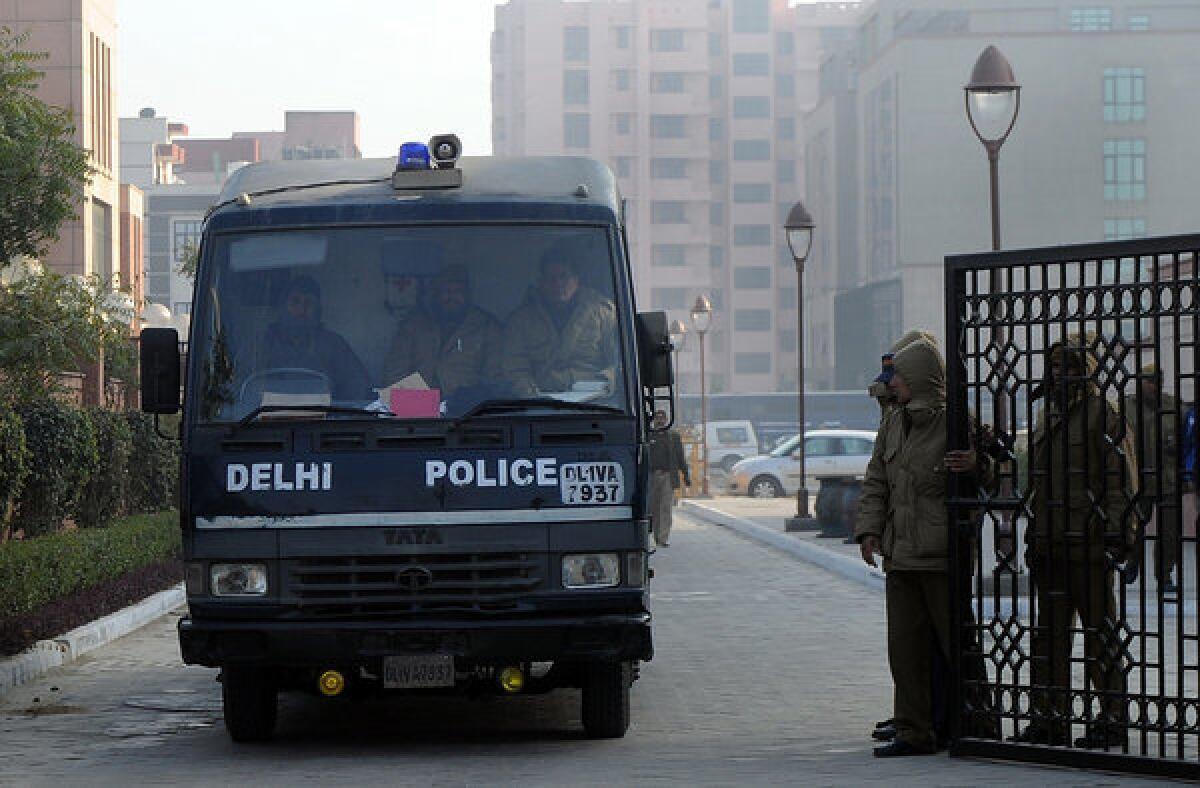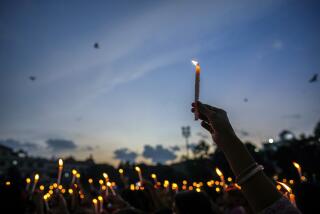Suspects appear in court in Indian rape case

- Share via
NEW DELHI – Protracted shouting by lawyers insisting that suspects in a high-profile gang rape case don’t deserve legal representation marked the first court appearance Monday of five defendants and raised concerns among legal and human-rights campaigners that inflamed passions could trump the men’s legal rights.
Apparently convinced of the defendants’ guilt based on media coverage of the case, members of a bar association representing lawyers in New Delhi’s Saket District Court announced last week that none of its members would represent the defendants. On Monday, they expressed their anger in a packed courtroom when lawyer M.L. Sharma and another unnamed attorney offered to defend the accused. Some in the raucous legal crowd condemned the pair as publicity seekers.
Sharma countered that under the Indian constitution everyone is entitled to a defense. “The accused are innocent until proven guilty,” Sharma told a local news agency later. “Had the accused been the children of rich and famous, many lawyers would have come to defend them.”
In the highly charged case, the five defendants and a sixth who claims to be a juvenile stand accused of picking up in a private bus a 23-year-old physiotherapy student and her 28-year-old male friend on Dec. 16, drawing the curtains and assaulting both riders with iron rods and repeatedly raping her as they rode around New Delhi.
The victims, who have not been officially named in accordance with Indian law, were tossed out of the bus naked. After several days in critical condition, the woman died Dec. 29 in a Singapore hospital.
The adult defendants have been charged with rape, murder, robbery, kidnapping, destruction of evidence and criminal conspiracy. The death penalty in India is rarely carried out, most recently last year involving the lone surviving gunman from the 2008 Mumbai attack that killed 166 people, but many prominent politicians and celebrities have called for its application in this case.
The sixth suspect, provided his status as a minor is upheld in a country where documentation is sometimes lacking, faces a maximum three years in a juvenile home. Two of the five adults reportedly have offered to turn state’s witness in hopes of a reduced sentence.
As chaos gripped the Saket District Court, a judge Monday told reporters and the general public to leave and banned media coverage of the proceedings. “The courtroom has become jampacked with lots of disturbance created from different nooks and corners,” said Judge Namrita Aggarwal. “It has become impossible to proceed.”
The case has ignited violent protests and soul-searching on the status of women and the competence of the police in India. In a television interview in which his face was shown but his name not provided, a man identified as the male victim said numerous passersby ignored them for more than 20 minutes as they lay naked and nearly unconscious by the road. When police showed up, he added, they argued over which precinct had jurisdiction for half an hour before bringing the couple to a hospital.
Outrage over the crime has sparked calls for punishments that include chemical castration, public executions, gender sensitivity training, an end to Western ways and obligatory covering of all female students.
“The political leadership is taking the easy way out by demanding hanging,” said Meenakshi Ganguly, South Asia director for Human Rights Watch. “Even if the bar association wants justice done, it shouldn’t try to block representation.”
Critics said the public passion could color legal proceedings in what is the world’s largest democracy. “With the media pressure and all the coverage of this case, perhaps they may not get a fair trial,” said K.S. Chauhan, a Supreme Court attorney. “When the media pressure is there, it’s difficult for judges to adjudicate on merit.”
The case will be tried in a newly formed fast-track court in a nation where cases often take several years to complete. The five adults, without a lawyer present, have been interrogated repeatedly by police who say they’ve extracted confessions.
While the state is expected to appoint a legal aid lawyer before the trial begins, the delay could undercut the suspects’ ability to mount a proper defense, Ganguly said.
“Today’s development was not good” involving the bar association, added Ajay Verma, a fellow with the civic group International Bridges to Justice that represents impoverished defendants. “We don’t know who is the real culprit and who isn’t. Let this come out in a trial. The lawyer is the person who helps the court to put the real facts out.”
India has tried to expedite its creaky legal system in the past with mixed success. Starting in 2000, the central government set up 1,200 fast-track courts but ended its support a decade later over high costs and a shortage of judges.
Weak laws are less a problem than enforcing those already on the books, women’s groups say, adding that poorly trained and paid police often ignore or refuse to file charges in rape and sexual harassment cases. “Police don’t take these kinds of cases seriously,” said Kavita Krishnan, secretary of the Delhi-based All India Progressive Women’s Assn., a civic group. “And in investigations, there’s a tendency to focus on the character of the woman and her past sexual history.”
India also needs to reform some of its built-in legal bias against women, she added, including exams of rape victims to establish whether they have had regular sex. If the victim is judged “habituated to sex,” she said, it can influence a court. “We inherited this from the British, it must be said, but we haven’t changed it [as the British have],” Krishnan added. “The government has yet to prohibit this practice.”
ALSO:
Philippines may end hunt for treasure looted by Marcos
Britain extradites terror suspect to face trial in New York
Indian prosecutors will seek death penalty in gang-rape case
Tanvi Sharma in the New Delhi bureau contributed to this report.
More to Read
Sign up for Essential California
The most important California stories and recommendations in your inbox every morning.
You may occasionally receive promotional content from the Los Angeles Times.










